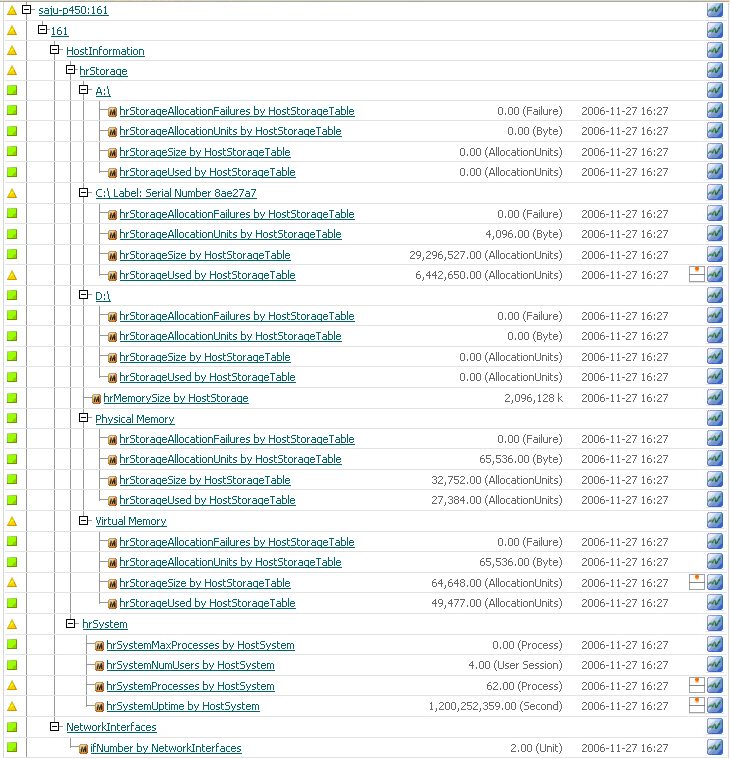Creating and Defining the MIB Configuration File
A Management Information Base (MIB) is a hierarchical database of information that defines properties of objects that are associated with an SNMP-managed device. It contains elements that map to your existing MIB hierarchy. The SNMP data collector uses this configuration file to identify the devices to monitor. The SNMP data collector also uses the MIB file to create the hierarchical structure that determines how Optimize displays information about the devices on the Monitored Components page.
The webMethods SNMP MIB configuration file has the following basic structure:
<?xml version="1.0" encoding="UTF-8"?>
<!DOCTYPE MIBConfig SYSTEM
"
Software AG_directory
/profiles/InfraDC/configuration/com.softwareag.infradc
.wmsnmpdc/config/MIBConf
ig.dtd">
<MIBConfig>
<ConfigType>
<MIBNode/>
<Key>
<.../>
</Key>
<Display>
<.../>
</Display>
<Monitor>
<.../>
</Monitor>
</ConfigType>
</MIBConfig>
The following table describes the elements of the SNMP MIB configuration file.
Element | Description |
<!DOCTYPE> | Reference to the document type definition file that defines the MIB configuration. |
<MIBConfig> | The root element. A <MIBConfig> element contains one or more <ConfigType> elements. |
<ConfigType> | A configuration type for an SNMP MIB object or sequence table node. Note:
The webMethods SNMP data collector cannot process a SEQUENCE as a parent type node. The Agent does not expect a SEQUENCE type to have any other ConfigType entries as a child. That is, a node that is a SEQUENCE cannot contain other ConfigType entries, and if it does, an error will be generated. Instances of the node you specify for this element appear on the My webMethods Monitored Components page. |
<MIBNode> | The MIB node to which the configuration type maps. |
Attribute | Description |
Name | The name of the node. |
OID | The node's object ID. |
Type | The data type of the node. Valid types are INTEGER, STRING, OBJECT, SEQUENCE, NULL, IPADDRESS, PHYSADDRESS, COUNTER, GAUGE, and TIMETICKS. |
Unit | For monitors, the unit associated with the monitor value in the System tree on the Analytics Overview page (for example, Byte). This attribute is required and can be any logical string. An empty string("") is not allowed. If this attribute is not provided, the default unit, Unit, is used. |
<Key> | A unique string to identify an instance of the object node. This string consists of fields constructed from one or more of the following elements: |
Element | Description |
<MIBNode> | The value of a child MIB node. |
<FixedNode> | The specified text string. |
Note:
When using a ConfigType of SEQUENCE, the MIBnode is expected to contain index information. The index information is used to discover node instances, which appear on the My webMethods Monitored Components page. |
<Display> | (Optional) A single MIB variable to appear in the Monitored Components page. |
<Monitor> | (Optional) The child node to monitor. Optimize displays the node you specify for this element in the following places:  In the Monitored Components page.  As a monitor in the system tree on the Analytics Overview page if you select it for monitoring. The <Monitor> element consists of one or more <MIBNode> elements. The <MIBNode> elements must be of Integer, Sum or Average type and they must represent child nodes of the configuration type with which the <Display> element is associated. |
The following table illustrates a sample MIBConfig.xml properties file and the hierarchy it creates in the system tree on the Analytics Overview page.
<?xml version="1.0" encoding="UTF-8"?> <!DOCTYPE MIBConfig SYSTEM
"
Software AG_directory
/profiles/InfraDC/configuration/com.softwareag.infradc
.wmsnmpdc/config/MIBConfig.dtd�"> <MIBConfig> <ConfigType Name="HostGroup"> <MIBNode Name="host" OID="1.3.6.1.2.1.25" Type="OBJECT"/> <Key> <FixedNode Value="HostInformation"/> </Key> |
<ConfigType Name="HostSystem"> <MIBNode Name="hrSystem" OID="1.3.6.1.2.1.25.1" Type="OBJECT"/> <Key> <FixedNode Value="hrSystem"/> </Key> <Monitor> <MIBNode Name="hrSystemUptime" OID="1.3.6.1.2.1.25.1.1"
Type="INTEGER" Unit="Second"/> <MIBNode Name="hrSystemNumUsers" OID="1.3.6.1.2.1.25.1.5"
Type="INTEGER" Unit="User Session"/> <MIBNode Name="hrSystemProcesses" OID="1.3.6.1.2.1.25.1.6"
Type="INTEGER" Unit="Process"/> <MIBNode Name="hrSystemMaxProcesses" OID="1.3.6.1.2.1.25.1.7"
Type="INTEGER" Unit="Process"/> </Monitor> </ConfigType> |
<ConfigType Name="HostStorage"> <MIBNode Name="hrStorage" OID="1.3.6.1.2.1.25.2" Type="OBJECT"/> <Key> <FixedNode Value="hrStorage"/> </Key> <Monitor> <MIBNode Name="hrMemorySize" OID="1.3.6.1.2.1.25.2.2"
Type="INTEGER" Unit="KBytes"/> </Monitor> |
<ConfigType Name="HostStorageTable"> <MIBNode Name="hrStorageTable" OID="1.3.6.1.2.1.25.2.3"
Type="SEQUENCE"/> <Key> <FixedNode Value="hrStorageTable"/> <MIBNode Name="hrStorageIndex" OID="1.3.6.1.2.1.25.2.3.1.1"
Type="INTEGER"/> </Key> <Display> <MIBNode Name="hrStorageDescr" OID="1.3.6.1.2.1.25.2.3.1.3"
Type="STRING"/> </Display> |
<Monitor> <MIBNode Name="hrStorageAllocationUnits"
OID="1.3.6.1.2.1.25.2.3.1.4" Type="INTEGER" Unit="Byte"/> <MIBNode Name="hrStorageSize" OID="1.3.6.1.2.1.25.2.3.1.5"
Type="INTEGER" Unit="AllocationUnits"/> <MIBNode Name="hrStorageUsed" OID="1.3.6.1.2.1.25.2.3.1.6"
Type="INTEGER" Unit="AllocationUnits"/> <MIBNode Name="hrStorageAllocationFailures"
OID="1.3.6.1.2.1.25.2.3.1.7" Type="INTEGER" Unit="Failure"/> </Monitor> </ConfigType> </ConfigType> <ConfigType Name="HostProcessor"> <MIBNode Name="HostProcessor" OID="1.3.6.1.2.1.25.3.3"
Type="OBJECT"/> <Key> <FixedNode Value="HostProcessor"/> </Key> <Monitor> <MIBNode Name="ProcessorLoad" OID="1.3.6.1.2.1.25.3.3.1.2"
Type="AVERAGE" Unit="percent"/> </Monitor> </ConfigType> <ConfigType Name="HostMemory"> <MIBNode Name="HostMemory" OID="1.3.6.1.2.1.25.5.1"
Type="OBJECT"/> <Key> <FixedNode Value="HostMemory"/> </Key> <Monitor> <MIBNode Name="MemoryConsumption" OID="1.3.6.1.2.1.25.5.1.1.2"
Type="SUM" Unit="KBytes"/> </Monitor> </ConfigType> </ConfigType> |
<ConfigType Name="NetworkInterfaces"> <MIBNode Name="interfaces" OID="1.3.6.1.2.1.2" Type="OBJECT"/> <Key> <FixedNode Value="NetworkInterfaces"/> </Key> <Monitor> <MIBNode Name="ifNumber" OID="1.3.6.1.2.1.2.1" Type="INTEGER"/> </Monitor> </ConfigType> </MIBConfig> |
Figure 9. Resulting system tree hierarchy on the Analytics Overview page
